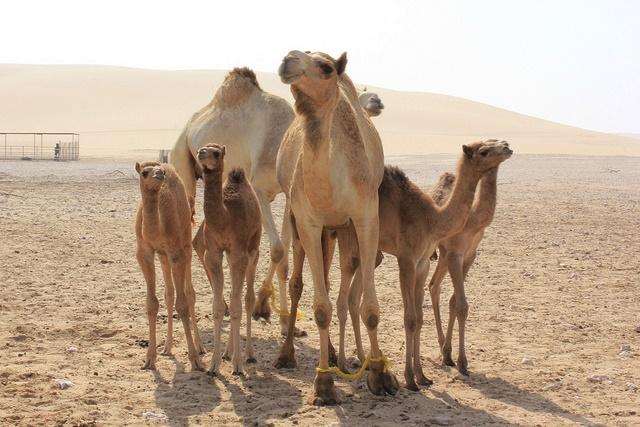A large Saudi Arabian camel sampling study published today revealed several new clues about MERS-CoV, building a strong case for the animals' role as the source of human infections, while a second study detailed early results for a camel vaccine.
Both studies were published today in Science. The camel MERS-CoV (Middle East respiratory syndrome coronavirus) sampling study was led by a team from Hong Kong and also included researchers from Saudi Arabia, Australia, and Egypt. The vaccine study was based at Erasmus Medical Center in the Netherlands and included scientists from Germany and Spain.
Samples yield MERS-CoV prevalence, lineages
For the first study, researchers sampled 1,309 camels at wholesale markets, slaughterhouses, and farms in Jeddah, Taif, and Riyadh in 2014 and 2015.
Overall, 25.3% were positive for coronaviruses, 12% of them specifically yielding MERS-CoV. Investigators saw a peak during the winter season, when as many as 23% of samples were positive for MERS-CoV.
Most of the animals that tested positive were from wholesale markets, and local camels were more likely to test positive than those that were imported from Sudan and Somalia.
Young camels—those younger than 1 year old—were most likely to be infected, with 34% testing positive for MERS-CoV or other coronaviruses. The rate was nearly double that for camels in other age-groups, which researchers said suggests that the younger ones play a key role in spreading the virus.
The virus was present in 25% of nasal swab samples, but only 1% of digestive tract specimens, hinting that airborne transmission as the most likely route for virus spread.
The team also found two other coronavirus species co-circulating in Saudi Arabia's camels, including a 229E-like virus that is closely related to a type of human coronavirus that is the most frequent cause of common colds. It was found in 20% of the camels. The other coronavirus they found was HKU23, which had previously been found in camels from Dubai.
Coronavirus coinfections were fairly common. Tests showed that 6.9% of animals were infected by two or three coronaviruses, and more than half of the camels infected with MERS-CoV tested positive for at least one other coronavirus. Researchers said that, taken together, the results show that dromedary camels are an important host for coronaviruses.
In another part of their study, the investigators looked at 93 full-gene sequences of camel coronaviruses, including 67 from MERS-CoV. Their analysis found that MERS-CoV diverged into five distinct lineages, with lineage 5 representing a recombination of lineages 3 and 4. The novel recombinant virus was first detected in camels in July 2014, but it wasn't detected in humans until February 2015. The fifth lineage led to human outbreaks in South Korea and the Middle East, according to the study.
Researchers said the findings support camels as the direct source of human MERS cases and that they can harbor other coronaviruses. They added that the patterns they found show that avoiding direct contact with camels, along with contaminated materials or environments, could help break the transmission chain to humans.
First trial of camel vaccine
In the second study, researchers tested the effectiveness of a vaccine for camels that uses a weakened poxvirus to deliver the MERS-CoV spike protein. The candidate virus, called MVA-MERS-S, was first developed 2 years ago and has gone through testing in mice.
The team vaccinated eight camels by intramuscular and nasal routes, half receiving MVA-MERS-S and half receiving a version that didn't contain the MERS-CoV spike protein. Camels got a booster shot 4 weeks later. Then 3 weeks after that the researchers experimentally infected the animals. Vaccinated camels had mild symptoms with significantly lower levels of virus compared with controls.
The team also found that the vaccine showed protection against camelpox virus, another disease that affects Saudi Arabia's camel population.
As one of the next steps, the researchers are getting ready to test MVA-MERS-S in humans, according to a press release today from Germany's Ludwig Maximilian University in Munich. It said the vaccine already meets several preconditions for human clinical trials, and a project is underway to pave the way for phase 1 trials. Currently, there are no human vaccines for MERS-CoV, though development is underway on a few candidate vaccines.
Support for emergence suspicions, vaccine
Michael Osterholm, MPH, PhD, director of the Center for Infectious Disease Research and Policy at the University of Minnesota, said the camel sampling study supports the case that MERS-CoV likely emerged on the Arabian Peninsula and why following virus pools for future human disease is so crucial. CIDRAP is the publisher of CIDRAP News.
He said the findings also provide a sense of the evolutionary process that global health officials need to be aware of.
The camel vaccine study is important, because it shows in principle that a camel vaccine can be found, Osterholm added. Because animals vaccinated with the experimental vaccine still shed some virus, it's not clear if it will be good enough, but he said a camel vaccine holds the potential of curbing the spread to humans.
Osterholm said during the SARS outbreak, health officials had an easier task at removing the animal host, which involved getting palm civets out of the markets. The challenge is much more difficult, though, with camels.
The key point is the vaccine is needed to interrupt MERS-CoV transmission from camels to humans, he said. "Even if the vaccine is moderately effective, it would still be important."
A MERS-CoV vaccine for camels might also cut transmission among camels, a key point to consider, given that the world could have a much bigger problem if the virus makes its way to Africa's camel population, Osterholm said. At 10.5 million, Africa's' camel population dwarfs the 1.5 million camel population in the Arabian Peninsula, he added.
See also:
Dec 17 Science coronavirus recombination study abstract
Dec 17 University of Hong Kong press release
Dec 17 Science press release
Dec 17 Science camel vaccine abstract
Dec 17 Ludwig Maximilian University press release
Dec 18 Science news report on camel vaccine





















